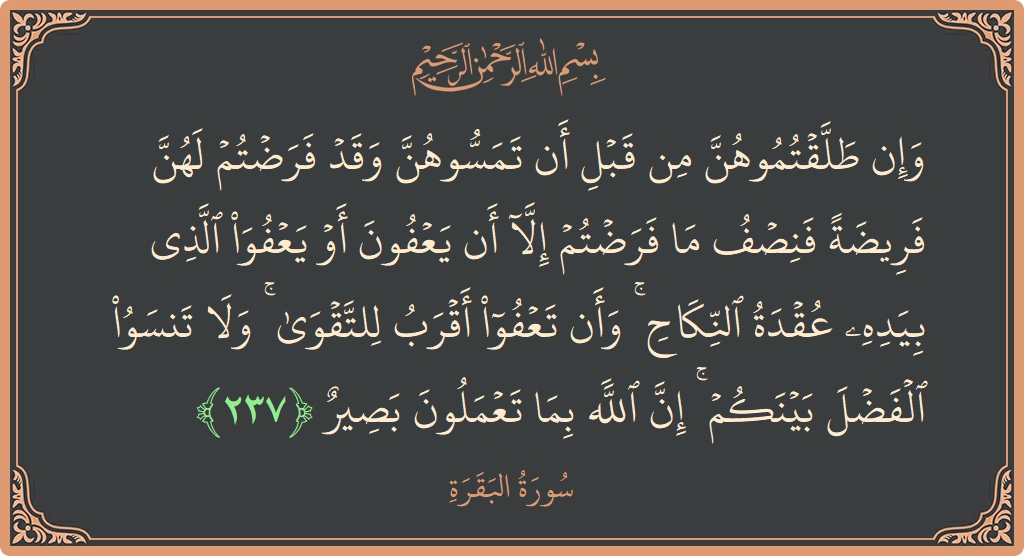Surah Al-Baqara: Verse 237 - وإن طلقتموهن من قبل أن... - English
Tafsir of Verse 237, Surah Al-Baqara
English Translation
And if you divorce them before you have touched them and you have already specified for them an obligation, then [give] half of what you specified - unless they forego the right or the one in whose hand is the marriage contract foregoes it. And to forego it is nearer to righteousness. And do not forget graciousness between you. Indeed Allah, of whatever you do, is Seeing.English Transliteration
Wain tallaqtumoohunna min qabli an tamassoohunna waqad faradtum lahunna fareedatan fanisfu ma faradtum illa an yaAAfoona aw yaAAfuwa allathee biyadihi AAuqdatu alnnikahi waan taAAfoo aqrabu lilttaqwa wala tansawoo alfadla baynakum inna Allaha bima taAAmaloona baseerunTafsir of Verse 237
In the second situation, when the woman's dower has been fixed before marriage and divorce occurs before actual consummation, the injunction says that the man shall be obligated to pay half of the dower already fixed. However, should the woman forgive, or should the man pay the whole, this will be a matter of free choice, as is evident from the verse:
إِلَّا أَن يَعْفُونَ أَوْ يَعْفُوَ الَّذِي بِيَدِهِ عُقْدَةُ النِّكَاحِ
Unless they (the women) forgive, or forgives the one in whose hand lies the marriage tie. (2:237)
The use of the word ya` fu يَعْفُوَ ('forgives' ) to cover even the payment of full dower, perhaps, reflects the customary Arab practice of the payment of dower amount simultaneously with the marriage. If so, the husband has become, in the event of a pre-consummation divorce, deserving of taking half of the dower back. Now, if he yields voluntarily and does not take his half back, this too, would virtually be an act of forgiving. And the act of forgiving has been declared more merit-worthy, and closer to Tagwa (the sense of being responsible to Allah, commonly rendered as piety or fear or righteousness in absence of an exact equivalent); because this forgiveness symbolically indicates that the severance of the bond of marriage was also done with magnanimity and good grace, which is the objective of the Shari'ah and certainly, deserving of great merit -- the forgiveness could come from the woman, or from the man, it does not matter.
Explaining the words of the verse الَّذِي بِيَدِهِ عُقْدَةُ النِّكَاحِ whose hands lies the marriage tie), the Holy Prophet ﷺ has himself said: ولی عُقْدَةُ النِّكَاحِ , that is, 'the husband is the guardian (wali) of the bond of marriage.' This hadith appears in Darqutni as narrated by ` Amr ibn Shu'ayb from his father on the authority of his grandfather, and also from Sayyidna ` Aii ؓ and Sayyidna ibn ` Abbas ؓ (Qurtubi).
This also proves that the authority to continue or terminate the bond of marriage rests with the husband. It is he who can pronounce talaq (divorce). The woman cannot divorce her husband.
The Wife gets half of Her Mahr if She is divorced before the Marriage is consummated
This honorable Ayah is not a continuation of the Mut`ah (gift) that was mentioned in the previous Ayah (i.e., divorce before the marriage is consummated). This Ayah (2:237) requires the husband to relinquish half of the appointed Mahr if he divorces his wife before the marriage is consummated. If it was discussing any other type of gift, then it would have been mentioned that way, especially when this Ayah follows the previous Ayah related to this subject. Allah knows best. Giving away half of the bridal-money in this case is the agreed practice according to the scholars. So, the husband pays half of the appointed Mahr if he divorces his wife before consummating the marriage.
Allah then said:
(unless they (the women) agree to remit it,) meaning, the wife forfeits the dowry and relieves the husband from further financial responsibility. As-Suddi said that Abu Salih mentioned that Ibn `Abbas commented on Allah's statement:
(unless they (the women) agree to remit it,) "Unless the wife forfeits her right."Furthermore, Imam Abu Muhammad bin Abu Hatim said that it was reported that Shurayh, Sa`id bin Musayyib, `Ikrimah, Mujahid, Ash-Sha`bi, Al-Hasan, Nafi`, Qatadah, Jabir bin Zayd, `Ata' Al-Khurasani, Ad-Dahhak, Az-Zuhri, Muqatil bin Hayyan, Ibn Sirin, Ar-Rabi` bin Anas and As-Suddi said similarly.
Allah then said:
(...or he (the husband), in whose hands is the marriage tie, agrees to remit it.)
Ibn Abu Hatim reported that `Amr bin Shu`ayb said that his grandfather narrated that the Prophet said:
(The husband is he who has the marriage tie.)
Ibn Marduwyah also reported this Hadith, and it is the view chosen by Ibn Jarir. The Hadith states that the husband is the person who really holds the marriage tie in his hand, as it is up to him to go on with the marriage or end it. On the other hand, the Wali of the wife is not allowed to give away any of her rightful dues without her permission, especially the dowry.
Allah then stated:
(And to remit it is nearer to At-Taqwa (piety, righteousness).)
Ibn Jarir said, "Some scholars said that this statement is directed at both men and women." Ibn `Abbas said:
(And to remit it is nearer to At-Taqwa (piety, righteousness).) indicates that the one who forgives, is nearer to At-Taqwa (piety)." A similar statement was made by Ash-Sha`bi and several other scholars.
Mujahid, An-Nakha`i, Ad-Dahhak, Muqatil bin Hayyan, Ar-Rabi` bin Anas and Thawri stated that `liberality' mentioned in the Ayah refers to the woman giving away her half Mahr, or the man giving away the full Mahr. This is why Allah said here:
(And do not forget liberality between yourselves.) meaning, kindness (or generosity), as Sa`id has stated. Allah said:
(Truly, Allah is All-Seer of what you do.) meaning, none of your affairs ever escapes His perfect Watch, and He will reward each according to his deeds.
